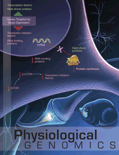
CHRONOBIOLOGY INTERNATIONAL
Scope & Guideline
Exploring the Rhythms of Life
Introduction
Aims and Scopes
- Circadian Rhythms and Health:
The journal emphasizes research on how circadian rhythms affect various health outcomes, including metabolic health, mental health, and the physiological responses to environmental changes. - Chronotype and Individual Differences:
Studies exploring the relationship between chronotype (morningness-eveningness) and individual differences in behavior, health, and performance are a core focus, reflecting the impact of personal circadian preferences. - Shift Work and Its Effects:
Research on the consequences of shift work on sleep quality, health outcomes, and circadian disruption is prominently featured, as it is pivotal in understanding occupational health. - Chrononutrition:
The journal covers the intersection of nutrition and circadian biology, examining how meal timing and dietary patterns influence health outcomes and metabolic processes. - Behavioral and Psychological Aspects of Circadian Rhythms:
Investigations into how circadian rhythms impact cognitive functions, mood, and psychological well-being are common, highlighting the importance of biological timing in behavioral sciences. - Animal Models and Experimental Studies:
The journal includes studies that utilize animal models to explore the mechanisms of circadian rhythms, contributing to the understanding of biological clocks in various species.
Trending and Emerging
- Impact of COVID-19 on Circadian Rhythms:
There is a growing body of research examining how the COVID-19 pandemic has altered sleep patterns, circadian rhythms, and overall mental health, reflecting the relevance of timely issues in public health. - Social Jetlag and Its Consequences:
Studies on social jetlag—discrepancies between biological and social clocks—and its effects on health and behavior are trending, emphasizing the importance of aligning personal rhythms with societal demands. - Chronotherapy and Timing of Interventions:
Emerging research on chronotherapy, which involves timing medical interventions to align with biological rhythms, is gaining traction, highlighting its potential for improving treatment efficacy. - Interdisciplinary Approaches to Chronobiology:
There is an increasing trend towards interdisciplinary studies combining chronobiology with psychology, nutrition, and public health, reflecting a holistic understanding of biological rhythms. - Technological Advances in Sleep Measurement:
The use of wearable technology and actigraphy in assessing sleep and circadian rhythms is on the rise, showcasing the integration of technology in chronobiological research. - Psychiatric Disorders and Chronotype:
Research linking chronotype to various psychiatric conditions, including depression and anxiety, is expanding, indicating a deeper exploration of the psychological dimensions of circadian biology.
Declining or Waning
- Purely Molecular Studies:
There is a noticeable decline in purely molecular studies focused on circadian genes without context to health or behavioral implications, as the journal shifts towards more applied research. - Generalized Sleep Studies:
Research that merely describes sleep patterns without linking them to specific health outcomes or behavioral consequences is becoming less common, indicating a trend towards more integrated studies. - Narrow Focus on Specific Populations:
Papers focusing exclusively on niche populations without broader implications or connections to general health trends seem to be decreasing, as the journal seeks to address more universal issues. - Static Models of Circadian Disruption:
The exploration of static models of circadian disruption without considering dynamic interactions with lifestyle factors or environmental variables is waning, reflecting a shift towards more comprehensive approaches.
Similar Journals

JOURNAL OF PHYSIOLOGY AND PHARMACOLOGY
Elevating research standards in physiology and pharmacology.JOURNAL OF PHYSIOLOGY AND PHARMACOLOGY is a distinguished publication presented by the POLISH PHYSIOLOGICAL SOC, dedicated to advancing the fields of physiology and pharmacology. Since its inception in 1991, this journal has maintained a commitment to disseminating vital research findings, contributing to the growing body of knowledge essential for understanding complex biological systems and their interactions with pharmacological agents. With a consistent focus on interdisciplinary studies, the journal holds a Q3 categorization in both Medicine and Pharmacology as well as Physiology for 2023, reflecting its relevance in these crucial fields. Although specific access options are not available, the journal's robust indexing and rankings in Scopus signify its credibility and the high caliber of its contributions, appealing to researchers, professionals, and students alike. Operating from the picturesque Jagiellonian University in Krakow, Poland, this journal not only enriches the academic landscape but also fosters global collaboration and innovation in the life sciences.

JOURNAL OF SLEEP RESEARCH
Advancing Knowledge in Sleep and Neuroscience.JOURNAL OF SLEEP RESEARCH, published by Wiley, stands as a leading platform for disseminating innovative research and insights in the fields of sleep science, behavioral neuroscience, and cognitive neuroscience. With a commendable Impact Factor that reflects its pivotal role in advancing our understanding of sleep and associated neurological processes, this journal ranks in the top quartile (Q1) across multiple categories in 2023—demonstrating its substantial influence and outreach. The journal's dedicated focus spans various aspects of sleep research, from basic science to clinical applications, making it an invaluable resource for researchers, clinicians, and students alike. Operating from the United Kingdom, the journal has been in continuous circulation since 1992 and will continue to contribute to the field until at least 2024. For those seeking to enrich their knowledge and stay abreast of the latest advancements in sleep research, the JOURNAL OF SLEEP RESEARCH is an essential read.

FISH PHYSIOLOGY AND BIOCHEMISTRY
Charting New Waters in Fish Physiology ResearchFISH PHYSIOLOGY AND BIOCHEMISTRY, published by Springer, is a leading journal in the fields of aquatic science, biochemistry, and physiology, with an impressive trajectory since its inception in 1986 and continuing through 2024. Operating from the Netherlands, this journal serves as a vital platform for researchers, professionals, and students alike, showcasing innovative studies that explore the physiological and biochemical aspects of fish, contributing significantly to our understanding of aquatic ecosystems and their inhabitants. With a robust impact factor reflected in its Q1 status in Aquatic Science and notable rankings in other relevant categories, FISH PHYSIOLOGY AND BIOCHEMISTRY maintains a strong scholarly influence, evidenced by its Scopus ranking within the top quartiles of various biological sciences disciplines. While the journal does not currently offer open access options, it remains a cornerstone for advancing knowledge and fostering collaboration within the community dedicated to aquatic biology and related fields.

Somnologie
Exploring the Depths of Sleep ScienceSomnologie is a prestigious academic journal published by SPRINGER INT PUBL AG, focusing on the interdisciplinary field of sleep medicine. Established in 1997, this journal has consistently provided a platform for cutting-edge research and review articles that explore the various physiological, psychological, and pharmacological aspects of sleep. With a current impact factor placing it in the Q3 category in Physiological (Medical) studies, it ranks #82 out of 113 in Scopus, representing a notable presence in the field. Though not an Open Access journal, Somnologie remains vital for researchers, clinicians, and students seeking to deepen their understanding of sleep science. Located in Germany, this journal promotes global collaboration, and its comprehensive archive from 1997 to the current year serves as an invaluable resource for the ongoing advancements in sleep-related studies.

SLEEP MEDICINE REVIEWS
Exploring the Frontiers of Sleep Medicine Research.SLEEP MEDICINE REVIEWS, published by W B SAUNDERS CO LTD, is a leading journal in the field of sleep medicine, recognized for its comprehensive and critical assessments of current research and clinical practices. With an impressive impact factor that places it in the Q1 category across various disciplines including Neurology, Pulmonary and Respiratory Medicine, and Physiology, this journal has become essential reading for researchers, healthcare professionals, and students dedicated to understanding the complexities of sleep and its impact on health. The journal has significantly contributed to the academic landscape since its inception in 1997, and continues to advance knowledge up to 2024. Although it is not an Open Access publication, subscribers gain access to high-quality reviews that synthesize cutting-edge research findings, critical methodologies, and practical applications in sleep medicine. Its high ranking—2nd among 192 in Neuroscience and Neurology and 9th among 400 in Neurology (Clinical)—underscores its pivotal role in shaping future research and clinical guidelines.

Journal of Turkish Sleep Medicine-Turk Uyku Tibbi Dergisi
Bridging Knowledge Gaps in Sleep MedicineThe Journal of Turkish Sleep Medicine-Turk Uyku Tibbi Dergisi, published by GALENOS PUBL HOUSE, is a premier open access journal dedicated to advancing the field of sleep medicine. Since its inception in 2014, this journal has provided a vital platform for researchers, clinicians, and students interested in the complexities of sleep disorders and their treatments. The journal features rigorous peer-reviewed articles that encompass a wide range of topics within sleep medicine, including epidemiology, diagnosis, treatment modalities, and innovative research methodologies. With an ISSN of 2148-1504 and E-ISSN 2757-850X, the journal strives to disseminate impactful findings to a global audience. The accessibility provided by its open access model ensures that the latest research reaches those who need it most, thereby fostering collaboration and knowledge sharing within the scientific community. As an essential resource in the realm of sleep research in Turkey and beyond, it plays a critical role in shaping future studies and health policies related to sleep health.

Physiological Reports
Exploring Innovative Insights into Biological ProcessesPhysiological Reports is a pioneering open-access journal published by WILEY, dedicated to advancing the field of physiology through the dissemination of high-quality research. Since its inception in 2013, this journal has provided a platform for innovative studies in both general physiology and medical physiology, making significant contributions to our understanding of biological processes. With an impact factor that reflects its growing influence—as evidenced by its placement in the Q2 category for physiology and medical physiology in 2023—Physiological Reports is positioned as a vital resource for researchers and practitioners alike. The journal encourages the submission of diverse studies ranging from cellular mechanisms to systemic physiology, presenting a unique opportunity for authors to reach a global audience without access barriers. It has established a reputation for rigorous peer review and timely publication, ensuring that cutting-edge research is readily available to stimulate further inquiry and collaboration in the scientific community.

Physiological Genomics
Unlocking the Genetic Mysteries of PhysiologyPhysiological Genomics is a prestigious scholarly journal published by the American Physiological Society, dedicated to advancing the understanding of the genetic underpinnings in physiology. With an ISSN of 1094-8341 and an E-ISSN of 1531-2267, this journal serves as a vital platform for researchers exploring the intersection of genetics and physiological processes. As of 2023, it enjoys a respectable impact factor, particularly standing strong in the Q2 quartile in both Genetics and Physiology categories, illustrating its importance within a competitive landscape. With an impressive rank of #69 out of 193 in Biochemistry, Genetics, and Molecular Biology - Physiology, and #128 out of 347 in Genetics, it reflects a robust commitment to quality research. Committed to fostering innovation, Physiological Genomics provides comprehensive access to groundbreaking studies from 1999 to 2024 and remains a quintessential resource for researchers, professionals, and students alike aiming to enhance their understanding of physiological genomics.

Sleep Health
Illuminating the Path to Better Sleep and HealthSleep Health is an esteemed journal published by Elsevier, dedicated to the rapidly evolving field of sleep research. With its ISSN 2352-7218 and E-ISSN 2352-7226, this journal serves as a pivotal platform for disseminating high-quality research on the interconnections between sleep and health, covering a diverse range of topics including behavioral neuroscience, neuropsychology, and the social sciences. Since its inception in 2015, Sleep Health has achieved recognition as a Q1 journal across several categories, ranking in the 93rd percentile among social sciences, ensuring its significant influence within the academic community. Despite being a non-open access journal, it attracts a broad audience due to its commitment to advancing knowledge and understanding of sleep's critical role in human health. Situated in the United States with operational facilities in Amsterdam, the journal invites contributions from researchers and practitioners alike, fostering a multidisciplinary approach to sleep studies and encouraging collaboration across diverse fields.

Nature and Science of Sleep
Shaping the Future of Sleep ResearchNature and Science of Sleep is an esteemed open-access journal published by Dove Medical Press Ltd, dedicated to the interdisciplinary fields of sleep science and behavioral neuroscience. Since its inception in 2009, the journal has become a vital resource for researchers, clinicians, and students alike, offering a platform for innovative research and insights that advance the understanding of sleep and its profound effects on human health and behavior. With a commendable Q2 ranking in both Applied Psychology and Behavioral Neuroscience as of 2023, it positions itself in the top tier of its fields, reflecting its importance and relevance in ongoing discussions and research. Accessible globally, Nature and Science of Sleep serves to bridge the gap between basic research and practical applications, facilitating the dissemination of knowledge that informs better practices in sleep medicine, psychology, and neuroscience. With an active commitment to fostering scientific dialogue, the journal continues to influence best practices and set new standards in sleep research through its rigorous peer-review process and focus on high-impact studies.